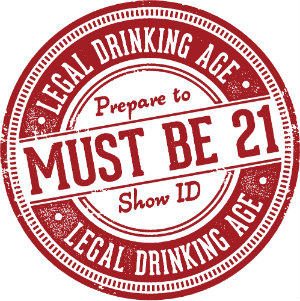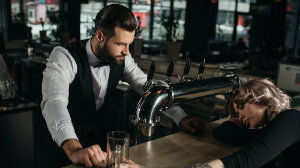Dram Shop Law Offers Relief to Victims of Drunk Drivers
Most people are aware that a drunk driver can be held legally liable when his or her intoxication results in the injury or death of another. Under certain circumstances, victims of drunk drivers may also be able to hold the establishment where the driver was drinking responsible.
Bars, taverns, restaurants and other similar establishments have a legal responsibility not to serve alcohol to customers who may be visibly intoxicated. This is referred to as Dram Shop Law.
Does Dram Shop Law apply in your Case? Let’s Talk.
Dram Shop involves:
- Over-serving alcohol by bars, taverns, restaurants and other establishments
- Illegally serving alcohol to minors
Dangers of Underage Drinking
 In 2011, according to the National Survey on Drug Use and Health (NSDUH), about 20.9% of youth ages 14 to 15 reported having at least 1 drink in their lifetime.
In 2011, according to the National Survey on Drug Use and Health (NSDUH), about 20.9% of youth ages 14 to 15 reported having at least 1 drink in their lifetime.
Youth who start drinking before age 15 years are six times more likely to develop alcohol dependence or abuse later in life than those who begin drinking at or after age 21 years.
Over a quarter of 8th graders have tried alcohol.
Underage drinking happens in many places – at home, at a friend’s house, social gatherings and even at bars, restaurants, taverns and other similar places.
Case Results
$725,000 Settlement against a Restaurant & Bar for negligently serving alcohol to a minor patron who was severely injured in an automobile accident after leaving the premises.
Sources:
Missouri’s Dram Shop Law
Under Missouri’s statute, an injured person may bring a civil claim against a bar, tavern or similar establishment if it served a person who was “visibly intoxicated.” That means the person shows “significantly uncoordinated physical action or significant physical dysfunction” such as:
 Slurred or incoherent speech
Slurred or incoherent speech- Difficulty finishing thoughts or sentences
- Glassy or bloodshot eyes
- Stumbling, falling or poor coordination
- Slowed reaction time
While many other states allow claims against any licensed alcohol vendor, in the state of Missouri, the law specifies that dram shop cases can only be brought against a vendor “licensed to sell intoxicating liquor by the drink for consumption on the premises.” This means the statute leaves out convenience stores or shops that sell packaged alcohol.
In a Missouri dram shop claim, the injured plaintiff must show by “clear and convincing evidence” that the alcohol vendor continued to serve alcohol even after the person who caused the injuries became “visibly intoxicated.”
Let us help you understand Dram Shop Law. Contact us at (877) 284-6600.
Missouri’s dram shop law also allows an injured person to seek damages from a vendor that serves alcohol to a minor under age 21, even if the minor was not “visibly intoxicated.”
Missouri Revised Statutes section 537-053
Case Results
$300,000 (policy limits) wrongful death settlement for a minor who was struck and killed by a hit and run driver on the interstate. Our investigation revealed that the minor (18-year old boy) was legally intoxicated from being served alcohol at a night club. Nash & Franciskato were able to present evidence that the night club had a pattern and practice of illegally serving minors.
Legal Experts to Build Your Case
Dram shop law can be complicated; however, the Nash & Franciskato Law Firm in Kansas City understands how to apply these laws. For you, that means experienced personal injury attorneys who are resourceful and tenacious in proving liability and protecting your legal rights.
The attorneys at Nash & Franciskato Law Firm in Kansas City work to understand the circumstances surrounding your case, which might include:
- Interviewing bartenders, wait staff and customers of the establishment who may have witnessed the drunk driver purchasing alcoholic drinks
- Investigating how the establishment trains its bartenders and wait staff to cut off service to intoxicated customers before they become a hazard
- Subpoenaing records of debit or credit cards of the drunk driver
- Determining whether the establishment served someone without requesting proof of age or someone who would likely become intoxicated as a result of the amount that was served to him/her
When you have questions, our team is here to answer them for you.
Our attorneys understand that each injury, each fatality affects not only the person in the crash, but family, friends and more. We are determined to fight for your rights and obtain the compensation you deserve. With our attorneys, you will have:
- Over 80 years of combined experience
- Trusted legal advisor committed to your needs
- Super Lawyers for over 10 years
- The AV Preeminence Rating for Ethical Standards & Legal Ability
- Compassionate advocacy for you and your family
- Free, no-obligation review of your case
Need Additional Information or resources?
- Legal Risks Bartenders Face for Overserving Alcohol
- Underage Drinking, National Institute on Alcohol Abuse and Alcoholism
- Dram Shop Laws and Social Host Liability for Alcohol-Related Accidents in Missouri
- Blog articles related to automobile safety and accidents and Dram Shop Law
Receive a Free Evaluation from Kansas City Dram Shop Attorneys
Have you been seriously injured in an automobile accident where the driver got visibly intoxicated at a bar? If so, you may have a dram shop case. Call Nash & Franciskato. We have a successful track record helping accident victims collect the compensation they deserve.
In the Kansas City area and across Missouri, the Nash & Franciskato Law Firm will fight for your rights. Contact our lawyers today for a free, no-obligation evaluation of your case.
Contact Us for a Free Review of Your Case
*Source for statistics: Drunk Driving, NHTSA
FAQ
Dram shop laws, enforced through civil lawsuits, allow the victims of drunk driving accidents or their families to sue alcohol vendors or retailers for the death, injury, or other damages caused by an intoxicated customer.
No. Oftentimes, states that have Dram Shop laws define terms in their statutes differently. For instance, “guest,” “patron,” or “retailer” can carry different meanings. Most of the time, however, the application of the “obvious intoxication test,” where a retailer knew or should have known that the patron was so intoxicated that more alcohol would cause danger to himself or to others, is the same.
